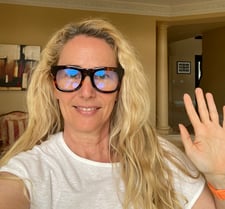This International Women’s Day falls on the one-year mark of the beginning of one of the most difficult periods we’ve collectively experienced. Last year at this time, we were aware of the new, dangerous strain of coronavirus and feared it was about to hit us close to home. While we were uncertain of exactly how our lives and livelihoods would be impacted — we were even more oblivious to its disproportionate impact on the lives and livelihoods of women. We went on to endure a year of social upheaval and political turmoil that exposed the fissures in the very foundation of justice and equality, and threatened the progress we’ve made toward creating a fair and equal society for every man, woman and child.
And while our challenges are far from over, especially for women, there is so much hope ahead! In order to move forward, we need to be realistic and thoughtful about what has transpired over the last year. We also need to be intentional about how we recover from our shared trauma. We must strive to make up lost ground with resiliency and a renewed commitment to facing the future head-on.
We Can’t Dial Back Our Progress
During the pandemic, equality for women took a giant step backwards. I am by nature an optimist, especially when it comes to the transformative power of championing women to thrive, but the pandemic economy has disproportionately affected working women and women of color— and we need to rectify this quickly if we are to fight our way back.
The innocuous-sounding “Pink Collar Recession” is a serious situation: working moms are cutting back hours or leaving the workforce altogether at a staggering rate. It’s no wonder, as working mothers spend 15 hours more per week than fathers on childcare and household duties. What’s more, women ,who represent nearly two-thirds of frontline workers, are often earning less than people collecting unemployment benefits.
In addition, the plight of BIPOC employees and the discrimination they continue to face in the workplace has been thrust to the forefront of the corporate conscience — right where it has always belonged. When you consider that 67.5% of Black mothers and 41.4% of Latina mothers are the primary or sole breadwinners for their families, their departure from the workforce and inability to provide for their families is a full-blown crisis. This isn’t “OK.”
The solution to this crisis needs to come from company leaders who are willing to make a case for caring — now.
My Case for Caring
I decided to spend my nights and weekends for the better part of 2020 writing a book, It’s Personal: The Business Case for Caring, because now more than ever those of us in leadership positions need to offer solutions. Needless to say, all of these aforementioned issues were top of mind for me — they inspired me and reminded me, every day, what truly matters to people: their health, their families, their sense of purpose and belonging. If their employers don’t support these things, how can they be expected to feel good about the work they do and show up as their whole selves each and every day? Clearly, if there was ever a time to acknowledge that the employer-employee contract is personal, that corporate cultures are personal, and that caring for employees is therefore central to organizational success, that time is now.
For me, it was personal! I was not going to sit by and watch my employees struggle; I was going to do something about it.
 While so many companies were downsizing or restructuring as a result of pandemic disruption, I found a case for caring within my own organization and ensured we walked the talk. I wanted to be certain that our workplace — our virtual one, as it were — remained a safe place that nurtures our diverse team, that supports a wide range of needs, and helps my fellow Grokkers find balance where they need it most. For women, this tends to fall in the realm of family caretaking, so I gave my team explicit permission to take care of themselves as they work from home and look after loved ones, even if they were providing support from a distance.
While so many companies were downsizing or restructuring as a result of pandemic disruption, I found a case for caring within my own organization and ensured we walked the talk. I wanted to be certain that our workplace — our virtual one, as it were — remained a safe place that nurtures our diverse team, that supports a wide range of needs, and helps my fellow Grokkers find balance where they need it most. For women, this tends to fall in the realm of family caretaking, so I gave my team explicit permission to take care of themselves as they work from home and look after loved ones, even if they were providing support from a distance.
One of my female department heads was managing her aging parents’ affairs as they transitioned into assisted living, and never expected that she wouldn't be able to spend time with them, in person, when their new facility went into lockdown. When her father passed away last year, it was excruciating for her to manage her grief without the usual, in-person support of friends and family. My heart went out to her on a personal level, but as a manager I knew that empathy is only as useful as we let it dictate our actions, and the permissions we give our people to take care of themselves. I encouraged her to take the time off she needed and made certain she knew that the entire team was behind her.
Other team members, women and men alike, found themselves suddenly working from home alongside toddlers or school-aged kids, a task that’s challenging enough without a pandemic going on around them. We had to quickly pivot into video conferencing with the full expectation that kids would be running amok in the background — all while working exceptionally hard to keep the company running smoothly as we dropped the paywall during the virus’s outbreak to serve the people who needed our resources more than ever. Like so many others, we were under pressure from various fronts, and our wellbeing hung in the balance. I just couldn’t let it collapse.
This was easier said than done — and I was also open with my employees about how I was struggling. I, myself, had COVID-19 and needed to take care of myself while running a company and checking in on the welfare of various family members, including my husband and our adult children, my mother, brothers and sister, nieces and nephews, in addition to my employees. It’s hard to remember a more difficult time. As CEO I felt that I had to provide more robust employer support and understanding. It was my duty and responsibility to try to make my teams’ lives just a little bit easier, and to make them feel seen.
Another Giant Step Ahead for Diversity and Inclusion
One of the most important steps my company took in 2020 was to initiate the search for a Chief Diversity Officer. We hired Susan Van Klink, who also serves as our Chief Revenue Officer, to be the keeper of our commitment to customers and to equity for our employees. In her role overseeing Grokker’s diversity and inclusion initiatives, Sue is ensuring that our organization supports employees as well as our solution’s end-users so that everyone “sees themselves” — and sees opportunities for themselves — reflected in every brand interaction. This work most certainly includes empowering the women in our company to aim high and help them realize their potential.
 Putting it into her own words, Sue explains, “I’m committed to helping Grokker grow in a way that ensures we have access to the broadest group of talent and are not making unconsciously biased decisions. The work of developing a caring culture — a culture of belonging — must be intentional,” she continues. “We are committed to building diversity, inclusion, equity, and belonging into everything we do. Everyone, from employees and Experts to members, should feel they belong at Grokker regardless of their sexual orientation, color of skin, spiritual beliefs, age, and/or abilities.”
Putting it into her own words, Sue explains, “I’m committed to helping Grokker grow in a way that ensures we have access to the broadest group of talent and are not making unconsciously biased decisions. The work of developing a caring culture — a culture of belonging — must be intentional,” she continues. “We are committed to building diversity, inclusion, equity, and belonging into everything we do. Everyone, from employees and Experts to members, should feel they belong at Grokker regardless of their sexual orientation, color of skin, spiritual beliefs, age, and/or abilities.”
Unlike most businesses, the Grokker team is more than 50% female at every level. But we must still remain vigilant in our hiring practices, our compensation strategy, and our cultural norms to safeguard the ethical and highly sensitive behaviors we have so intentionally encouraged. We know one another and strive to maintain a psychologically safe environment where each person feels free to show up exactly as they are and know they will be accepted. We have one another’s backs and feel we are in this together. It is when a male colleague speaks up to require a diverse slate of candidates for an engineering role, or to call out the inappropriate use of the word “girls” instead of “women,” or to inquire about a perceived microaggression and how to best address it, that I know we are succeeding.
#ChooseToChallenge
Last year on this International Women’s Day, I said, “Each for Equal means everyone deserves an equal opportunity to be successful, personally and professionally — and we’re all responsible for helping each other along the way.” This remains true. This year, I’ll add this refrain: “I Choose to Challenge that which continues to threaten a gender equal world because without all of us, working together to achieve it, we won’t.”

